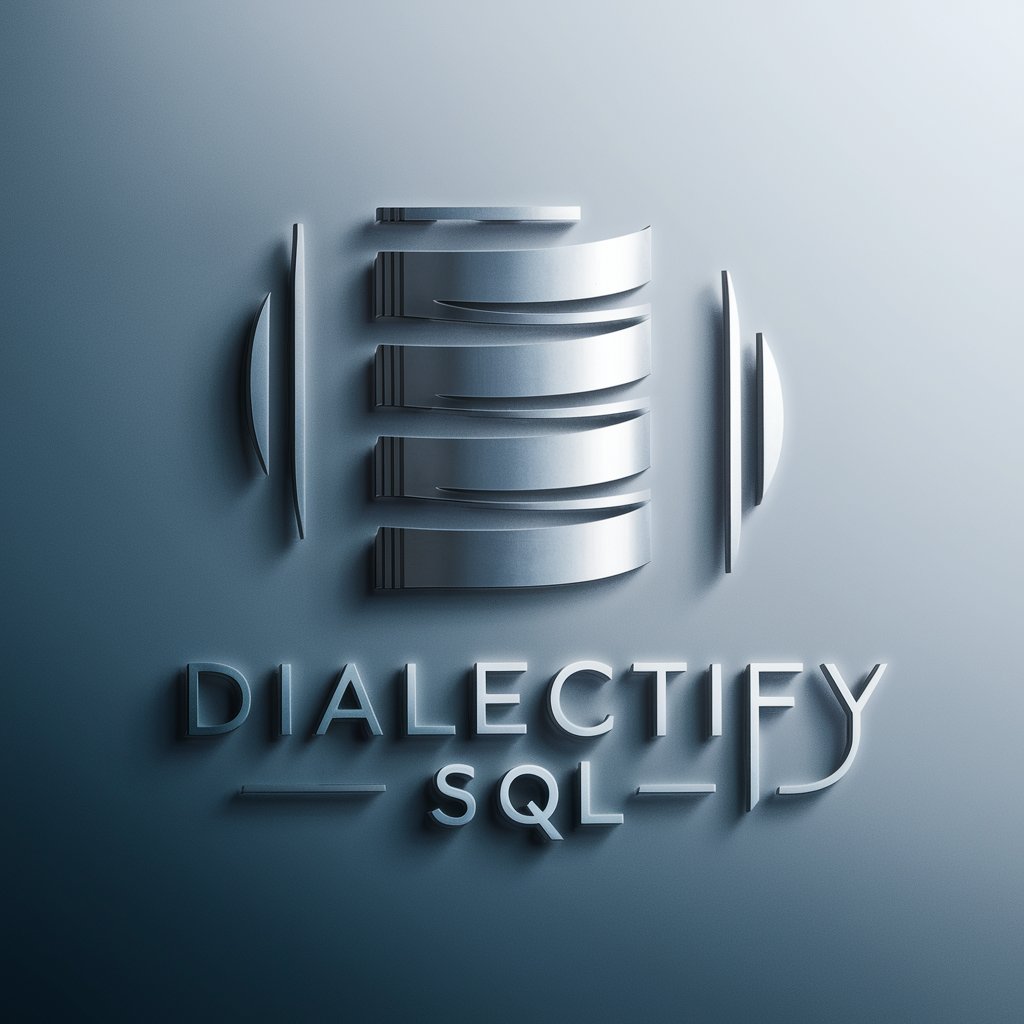Dialectify SQL - SQL Conversion Tool

Hello! Need help with SQL to Snowflake conversions?
Transform SQL with AI Precision
Convert this SQL stored procedure to Snowflake dialect:
How can I transform my SQL script for Snowflake compatibility?
Explain the steps to convert a SQL function to Snowflake syntax.
What are the best practices for adapting SQL stored procedures for Snowflake?
Get Embed Code
Introduction to Dialectify SQL
Dialectify SQL is a specialized tool designed to assist in the conversion of SQL stored procedures and scripts from one dialect to another, with a specific focus on the Snowflake dialect. It was developed to address the complexities and nuances involved in migrating database code across different SQL platforms, which often vary significantly in syntax and functionality. Dialectify SQL analyzes the original SQL code, identifies the dialect, and converts it into the target dialect, ensuring that the converted code adheres to the target platform's best practices and syntax requirements. For example, converting a Microsoft SQL Server stored procedure into a Snowflake-compatible format involves adjusting the syntax for declaring variables, modifying the control flow structures, and replacing platform-specific functions with Snowflake equivalents. Powered by ChatGPT-4o。

Main Functions of Dialectify SQL
SQL Dialect Identification
Example
Given a snippet of SQL code, Dialectify SQL can determine whether it's written in Oracle, MySQL, SQL Server, or another common dialect.
Scenario
When a user submits a script without specifying the original dialect, Dialectify SQL identifies the dialect to apply the correct conversion rules.
Dialect Conversion
Example
Converting T-SQL specific syntax, such as `SELECT TOP 10 * FROM table`, to a Snowflake-compatible `SELECT * FROM table LIMIT 10`.
Scenario
A data engineering team migrating their SQL Server databases to Snowflake needs to convert all stored procedures and scripts to be Snowflake-compatible.
Syntax Optimization for Target Dialect
Example
Optimizing a script to use Snowflake's ARRAY_AGG function instead of a GROUP_CONCAT equivalent in MySQL for better performance.
Scenario
Optimizing queries as part of the conversion process to leverage Snowflake's advanced analytics and storage capabilities, ensuring efficient data processing.
Error and Compatibility Checks
Example
Identifying and flagging the use of non-supported features like SQL Server's `CROSS APPLY` when converting to Snowflake.
Scenario
Ensuring that converted scripts do not contain syntax or functions that are incompatible with the target SQL dialect, preventing runtime errors.
Ideal Users of Dialectify SQL Services
Data Engineers
Professionals tasked with the migration, integration, and management of data across different platforms. They benefit from Dialectify SQL by streamlining the process of converting SQL scripts, reducing manual effort and minimizing errors.
Database Administrators (DBAs)
DBAs responsible for the maintenance, performance, and security of databases across various SQL dialects. They utilize Dialectify SQL to ensure smooth transitions between platforms and to maintain the integrity of database logic and structure during migrations.
Software Developers
Developers working on applications that interact with databases in multiple SQL dialects. They can use Dialectify SQL to quickly adapt their database interactions to be compatible with the target SQL dialect, facilitating cross-platform development and deployment.
Business Analysts and Data Scientists
While not the primary users, analysts and scientists benefit indirectly from Dialectify SQL's capabilities, as it enables seamless data migration and manipulation across platforms, ensuring that data is accessible and analyzable regardless of the underlying database technology.

How to Use Dialectify SQL
Initiate a Free Trial
Navigate to yeschat.ai for a complimentary trial access, no registration or ChatGPT Plus subscription required.
Identify Your Needs
Determine the SQL dialect you are working with and the target dialect you wish to convert to, focusing on Snowflake conversions.
Prepare Your SQL Scripts
Gather the SQL stored procedures or scripts you aim to convert, ensuring they are ready for analysis and conversion.
Utilize Dialectify SQL
Input your SQL scripts into Dialectify SQL, specifying the original and target dialects for accurate conversion.
Review and Implement
Examine the converted SQL scripts, leverage the provided explanations for understanding changes, and implement the new scripts in your Snowflake environment.
Try other advanced and practical GPTs
Discover New Zealand
AI-powered New Zealand discovery at your fingertips.

SPARK ✧ Convert
AI-powered, versatile file conversion

UK Construction Contract Analyst
AI-powered UK Construction Contract Insight

Azure Cloud Expert
Empowering Azure Success with AI Expertise

Course Crafter
Crafting Courses, Empowering Creators

Idea Forge
Expand Your Perspectives with AI

AI Resilient Assessment
Empowering Authentic Learning with AI Resistance

Plumber's Assistant
AI-powered plumbing problem solver

lingvocio
Revolutionizing Writing with AI-Powered Precision

GPT Tinder Advisor: AI choch for Profile Reviewer
Boost Your Match Potential with AI

ClickMojo Nachhaltigkeitsberater
Empowering sustainable living with AI

Meal Planning Ideas & Guide
Empowering your meals with AI

Detailed Q&A about Dialectify SQL
What is Dialectify SQL?
Dialectify SQL is an AI-powered tool designed to convert SQL stored procedures and scripts from one dialect to another, with a special focus on the Snowflake dialect, facilitating seamless database migrations and optimizations.
Can Dialectify SQL handle complex SQL conversions?
Yes, it specializes in handling complex SQL constructs, including stored procedures, user-defined functions, and intricate query syntax, providing detailed conversion explanations to ensure accuracy and reliability.
How does Dialectify SQL ensure conversion accuracy?
Dialectify SQL utilizes advanced AI algorithms and follows the official Snowflake documentation guidelines to accurately translate SQL syntax, while providing explanations for each conversion to help users understand the changes.
Is Dialectify SQL suitable for beginners?
Absolutely, it is designed with an intuitive interface that allows users of all levels, from beginners to advanced database professionals, to efficiently convert and understand SQL dialects.
How do I know if my SQL script conversion was successful?
Dialectify SQL provides a detailed report post-conversion, including a side-by-side comparison of the original and converted scripts, and explanations for the changes made, ensuring users can verify the success of the conversion.
